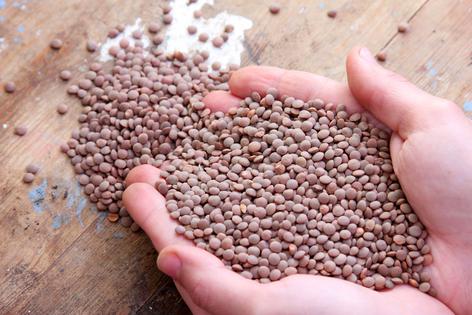Environmental Nutrition: Fighting disrupted digestion
There are many health conditions that can affect your gastrointestinal (GI) tract and cause uncomfortable, embarrassing and inconvenient symptoms like constipation, gas and bloating. But what if you can't blame a specific health condition? You and your doctor have confirmed you don't have irritable bowel syndrome, celiac disease or lactose intolerance, and yet you still have symptoms -- what do you do?
Beating the bloat
Bloating and distention (bloating plus an increase in abdominal size) are two of the most commonly experienced GI symptoms. More than one in five people report these symptoms, and of those who do, half say they have a significant impact on their quality of life. An excess of gas is the usual culprit.
According to the National Institute of Diabetes and Digestive and Kidney Diseases (NIDDK), one cause of gas and bloating is an excess of swallowed air. Everyone swallows some air when eating and drinking, but you might swallow more air than normal when you chew gum, drink carbonated beverages, eat or drink too quickly, smoke, suck on hard candy or wear loose-fitting dentures. If you burp excessively, you may be swallowing too much air.
Bloating with gas that is passed as flatulence is likely due to foods. The bacteria in your large intestine break down undigested sugars, starches and fiber, creating gas. High-fiber foods can cause gas and bloating if you aren't used to them, and many sugar-free products contain sugar alcohols -- sorbitol, mannitol and xylitol -- that can cause gas or loose stools.
Staying regular
Chronic constipation is another common complaint, affecting 10 percent to 20 percent of Americans. Women are two to three times more likely than men to have constipation, especially before menopause, possibly due to hormonal differences. Symptoms of constipation include hard, dry, or lumpy stools that are difficult or painful to pass, a feeling that not all stool has passed, or fewer than three bowel movements a week. Constipation can also happen when your life or daily routine changes (e.g., travel, dietary changes or new medications).
Narcotic pain medications contribute to constipation, but so can many other medications, including some anti-depressants, diuretics, and antacids that include aluminum and calcium, according to NIDDK. Health conditions that affect metabolism or hormones, such as diabetes or hypothyroidism, can also cause constipation. Ignoring the urge to have a bowel movement can lead to constipation, as can skimping on fiber and fluids.
"Most Americans are woefully short on getting adequate fiber in their diets," says Christine Rosenbloom, Ph.D., R.D.N., nutrition professor emerita at Georgia State University, and author of "Food & Fitness After 50." She says only 5 percent of Americans meet the adequate intake for fiber -- 25 grams per day for women and 38 grams for men up to age 50 (or 21 and 30 grams daily, respectively, for those over age 50).
Aging -- which none of us can avoid -- may be a factor in constipation, although this could be correlated to changes in habits, medications or health, rather than aging itself. "There are some age-related gut changes that predispose older individuals to constipation, including decreased elasticity of the colon wall, but diets low in fiber and water, along with inactivity, are bigger culprits," Rosenbloom says.
Promoting digestive health at home
It's important to talk to your doctor if you think certain medications or dietary supplements may be contributing to digestive symptoms, if you've noticed a sudden change in digestive symptoms, or if you also have unintended weight loss. Otherwise:
--Go for whole grains. Good sources of fiber include beans and lentils, fruits, vegetables and nuts, but Rosenbloom emphasizes the importance of whole grains. "It's hard to reach fiber goals without including grains, especially wheat bran. Bran fibers -- wheat, corn and oat -- are effective for preventing and treating constipation due to the high bulking effect and resistance to fermentation in the colon."
--Eat the peel. Rosenbloom recommends making "dirty" mashed potatoes or potato salad by leaving the peel on, scrubbing (but not peeling) carrots, and adding dried fruit to cereal or yogurt.
--Drink enough fluids. Dehydration can itself contribute to constipation, but staying hydrated also helps the fiber in your diet work more effectively.
--Reduce fried and high-fat foods. These tend to be low in fiber, which can contribute to constipation if they displace higher-fiber foods. They can also cause gas and bloating.
--Get regular physical activity. "Exercise helps all the muscles of the body, including the GI tract muscles," Rosenbloom says.
--Try "bowel training." "The urge to defecate usually only comes once a day, so ignoring it can lead to a reduced urge and subsequent constipation," Rosenbloom says. Give yourself adequate time to have a bowel movement at the same time every day.
--Go slowly. That goes for fiber and eating speed. Eating too quickly can allow excess air into the digestive tract, and increasing fiber too quickly can cause a temporary increase in bloating and gas.
(Environmental Nutrition is the award-winning independent newsletter written by nutrition experts dedicated to providing readers up-to-date, accurate information about health and nutrition in clear, concise English. For more information, visit www.environmentalnutrition.com.)







